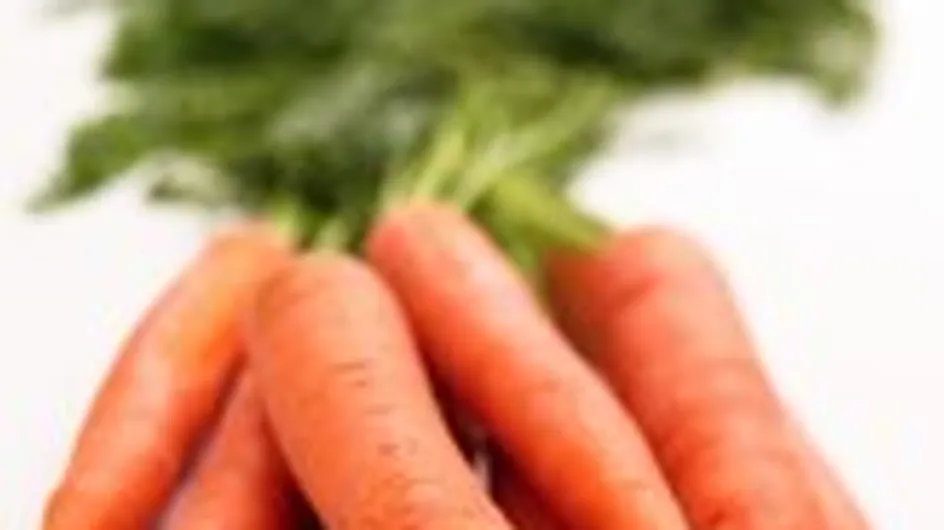All about carrots
The carrot is the second most popular vegetable in the UK, after the potato. They're naturally sweet and go down well with kids (for vegetables). They adapt to both sweet and savoury recipes - just take a look at our carrot recipes!
When are carrots in season?
Carrots are in season from autumn right through to summer (all year round, in other words) but they're most abundant in January and February. In March and April you’ll find new carrots in the shops. After a hot summer and a mild autumn, January’s carrots will be very sweet.
Also, carrot tops can be used in soups and savoury mash so don’t throw them away!
Cooking with carrots
Raw
Often grated and served in salads, carrots are even better when combined with raw courgette or freshly grated coconut. Add chopped carrot to your salads for a change instead of the usual grated carrot. Carrots marinated in a bit of olive oil, lemon juice and cumin make an original apéritif. Carrot sticks dipped in guacamole, tzatziki and other dips are also tasty and contain fewer calories than tortilla chips. And if you have a juicer, carrot juice is lovely first thing in the morning!
Cooked
In vegetable cakes (with potatoes and courgettes), mashed, in gnocchi, flans, soufflés, cottage pies, soups, chips, potato wedges, sauted in a wok... Carrots withstand all types of cooking!
For sweet tooths
There are some surprising but delicious sweet treats that you can make with carrots, including carrot cake, carrot crème brûlée, carrot flan and carrot sorbet with honey and raisins.
Good combinationsHerbs
mint, coriander, parsley, tarragon, thyme
Spices
cumin, curry powder, cardamom, ginger, cinnamon
Cheese
cheddar, munster and hard cheese
Sweet ingredients
coconut, honey, raisins, prunes, figs, apricots, apple
Seasoning
lemon juice, orange juice, balsamic vinegar, cider vinegar, walnut oil, hazelnut oil
Others
carrots go with all types of meat, poultry and fish, as well as with all other vegetables!!
Carrot tips
Stock and court-bouillon
Stock or court-bouillon should always include an onion pierced with a clove, a carrot cut into chunks and a bouquet garni.
Wizened or softened carrots
Leave them to soak in cold water for a few hours. They will rehydrate and become crunchy.
For less acidic ratatouille and bolognaise
Add half a chopped carrot to your mixture. The sweetness will counter the acidity from tomatoes.
For maximum vitamins
Don't peel carrots: scrape the skin off with a brush. As with the majority of fruit and vegetables, the vitamins are found in the skin.
Fibre and digestion
The fibre found in carrots are your intestines' best friends! Eaten raw, they aid the passage of food through the body, and eaten cooked they calm your intestines.
Babies Babies are often fed mashed carrots to start them off on solids because they like the sweet taste, and because cooked carrot is easy on their intestines.
Easy recipe: Grilled candied carrots
Cut 6 carrots into sticks and mix them with a tablespoon of olive oil, ground thyme or coriander, pepper and coarse salt. Place in an ovenproof dish and cook for 1 hour at 180°C (Gas Mark 4), stirring halfway through cooking. You’ll end up with candied carrots that smell divine!
Bonus beauty recipe
Carrots are rich in beta-carotene (pro-Vitamin A), a molecule that fights the effects of free radicals and combats skin ageing. It reacts with the sun’s UV rays and pigments the skin. So to get rid of your white pasty complexion and get a glow, start eating carrots! Especially 3 weeks before you go on your summer holiday, so you prepare your skin to capture the best of the sun. It’s important that the carrots you eat are fresh, otherwise they lose some of their vitamins, minerals and nutrients. And go steady with tablets containing lots of beta-carotene: they sometimes contain too much, and an orange complexion doesn’t suit everybody...
Nutrition and health
Eating a carrot for lunch isn’t going to make you thin, first of all because carrots aren't enough to keep you going, and secondly because they're sweet and can cause hyperglycaemia (an increase in blood sugar level) then hypoglycaemia (a rapid drop in blood sugar level), which produces energy slumps. It’s better to combine carrots with other foods if you’re on a diet.
Now that you know all there is to know about carrots, get cooking! Click here for carrot recipes.













